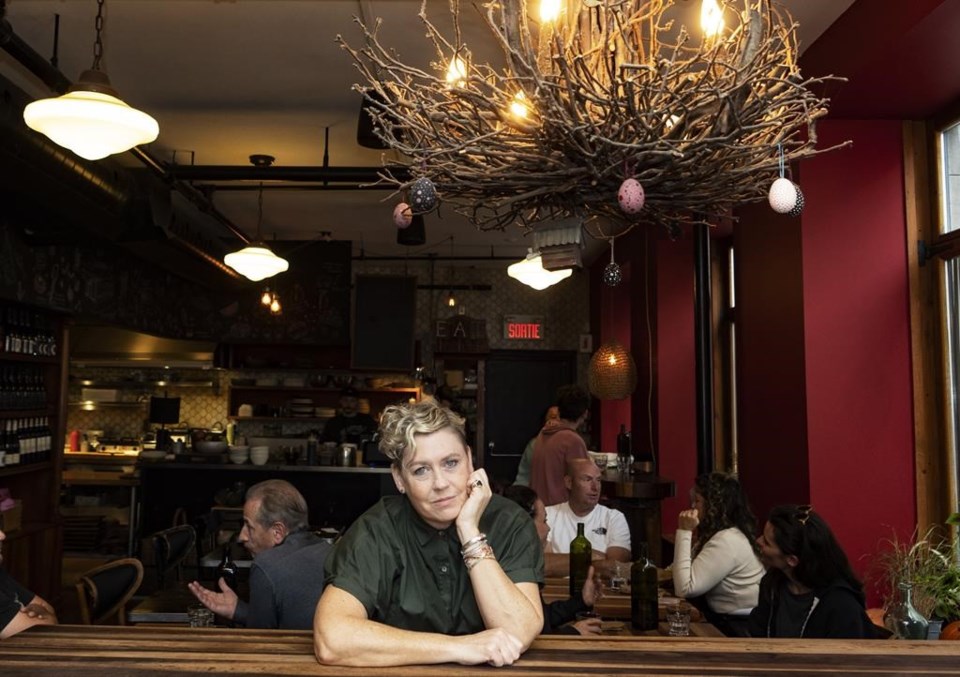MONTREAL ŌĆö As Montreal restaurants adapt to rising costs and impending deadlines to repay loans issued during the pandemic, one well-known chef says she worries about the future of the cityŌĆÖs famed dining scene.
Dyan Solomon, who owns three restaurants in the city, said that in the past, Montreal's famously low rents meant chefs could open their own places, and restaurants were able to thrive in part because customers had the disposable income to eat out.
But as rents rise, along with the price of food and labour, she worries the independent restaurants that have become the hallmark of Montreal's dining scene won't survive, leaving mostly chains and fast-food eateries, with only the most elite fine dining establishments on the higher end.
"That's really sad and depressing, but it looks a little bit like ... that is what will happen," she said. "I don't see how it can't. You're not going to pay $40 for a sandwich."
Solomon, who opened her first restaurant, Olive et Gourmando, in Old Montreal 25 years ago, said she's never seen anything like the price increases of the past few years, which have pushed the cost of "literally everything" up between 20 per cent and 30 per cent. "Restaurants are struggling, businesses are struggling, but we know our customers are struggling too, so it is a really difficult thing to navigate."
Solomon, who also owns Foxy, west of downtown, and Un Po Di Piu in Old Montreal, has built a reputation for working with local suppliers. She is committed to maintaining the quality of her food, but she said others might be tempted to use lower-quality ingredients to keep their prices stable.
Dominique Tremblay, a spokeswoman for the Quebec restaurateurs association, said many of her members have been left without the money to pay back federal government loans issued during the COVID-19 pandemic. People are going out less and wanting to spend less when they do go out, she said, and rainy summer weather only exacerbated the problem.
Those loans have to be repaid by Jan. 18 in order for businesses to have some of the loan forgiven, a deadline recently pushed back from Dec. 31.
"We've lost 4,000 restaurants since the beginning of the pandemic and there may be others that will close," she said, adding that her organization wants the deadline to be extended until the end of 2024.
Despite the economic headwinds, new restaurants are still opening in Montreal. Andrew Whibley and Pablo Rojas, who recently opened Bar Dominion in downtown Montreal, say their new establishment was shaped by the economic climate.
Whibley said that because they opened in a space that had been occupied by a restaurant that closed during the pandemic, they were able to save more than $1 million on renovations. The pair said theyŌĆÖre also attempting to appeal to a broad market, with lower prices and regular specials to keep the place full.
"It's only doable because we have the chance of being downtown, where we know we'll be able to hit the volume that we need to still make ends meet," Rojas said. "But if you were to do that on a smaller scale, I'm not sure it would be possible."
Rojas, who also co-owns Provisions, a steak house and wine bar, as well as a neighbouring butcher shop of the same name that serves sandwiches, said that adapting to higher costs may mean using cheaper cuts of meat, serving smaller portion sizes and finding ways to save money on takeout packaging.
Rojas said heŌĆÖd like to see the federal government forgive the loans and look at them as a one-time cost necessary to keep businesses afloat and protect jobs.
"At the end, it's the staff that's going to lose. It's people who were expecting a raise, who deserve a raise, that will not get it because there's no more money," Rojas said.
Montreal food writer J.P. Karwacki said heŌĆÖs noticed rising restaurant prices, as well as restaurants adapting by cutting back their opening hours, though he hasn't noticed a decline in the quality of the dishes.
Fixed-price multi-course meals and comfort foods could become more common on Montreal menus, he said, as will shorter menus, as restaurateurs look to maintain tighter control over inventory.
But he thinks dining out is too deeply ingrained in MontrealŌĆÖs culture for people to abandon restaurants altogether.
ŌĆ£We love to go to restaurants, we love to go to bars, we like to gather. And I would be very surprised if that was one thing that we were willing to sacrifice. The question is about how it's going to change,ŌĆØ he said.
Solomon is adjusting, looking to smaller menus that will require fewer kitchen staff and drawing on Asian influences to reduce the use of increasingly expensive ingredients that had been staples on her menu, such as cheese.
But even though dining rooms look like they're back to normal after the dark days of the pandemic, few restaurateurs have been able to recover financially from the closures, she said. "I think the assumption is it's all good now, and that's really not true, it would take a very long time to come back from this kind of financial disaster for restaurants."
This report by The Canadian Press was first published Oct. 29, 2023.
Jacob Serebrin, The Canadian Press


